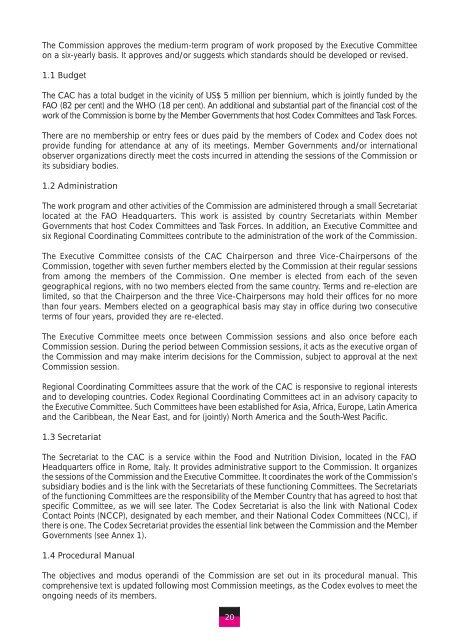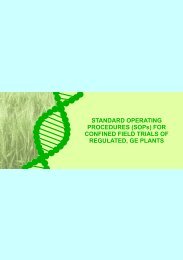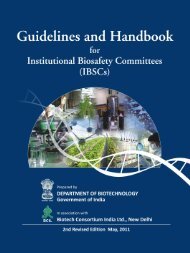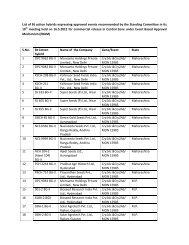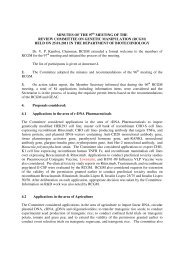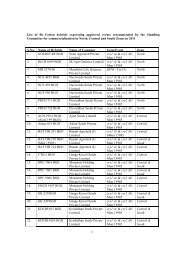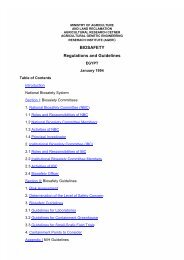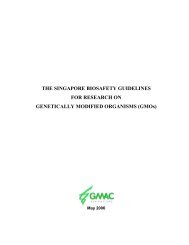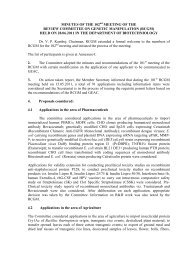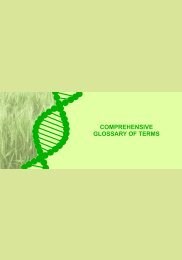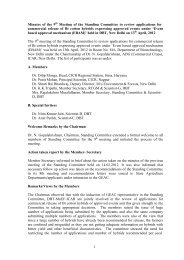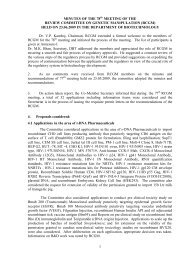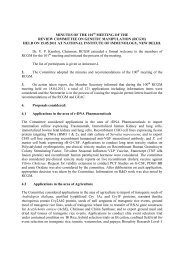THE USER'S MANUAL ON CODEX - Department of Biotechnology
THE USER'S MANUAL ON CODEX - Department of Biotechnology
THE USER'S MANUAL ON CODEX - Department of Biotechnology
You also want an ePaper? Increase the reach of your titles
YUMPU automatically turns print PDFs into web optimized ePapers that Google loves.
The Commission approves the medium-term program <strong>of</strong> work proposed by the Executive Committee<br />
on a six-yearly basis. It approves and/or suggests which standards should be developed or revised.<br />
1.1 Budget<br />
The CAC has a total budget in the vicinity <strong>of</strong> US$ 5 million per biennium, which is jointly funded by the<br />
FAO (82 per cent) and the WHO (18 per cent). An additional and substantial part <strong>of</strong> the financial cost <strong>of</strong> the<br />
work <strong>of</strong> the Commission is borne by the Member Governments that host Codex Committees and Task Forces.<br />
There are no membership or entry fees or dues paid by the members <strong>of</strong> Codex and Codex does not<br />
provide funding for attendance at any <strong>of</strong> its meetings. Member Governments and/or international<br />
observer organizations directly meet the costs incurred in attending the sessions <strong>of</strong> the Commission or<br />
its subsidiary bodies.<br />
1.2 Administration<br />
The work program and other activities <strong>of</strong> the Commission are administered through a small Secretariat<br />
located at the FAO Headquarters. This work is assisted by country Secretariats within Member<br />
Governments that host Codex Committees and Task Forces. In addition, an Executive Committee and<br />
six Regional Coordinating Committees contribute to the administration <strong>of</strong> the work <strong>of</strong> the Commission.<br />
The Executive Committee consists <strong>of</strong> the CAC Chairperson and three Vice-Chairpersons <strong>of</strong> the<br />
Commission, together with seven further members elected by the Commission at their regular sessions<br />
from among the members <strong>of</strong> the Commission. One member is elected from each <strong>of</strong> the seven<br />
geographical regions, with no two members elected from the same country. Terms and re-election are<br />
limited, so that the Chairperson and the three Vice-Chairpersons may hold their <strong>of</strong>fices for no more<br />
than four years. Members elected on a geographical basis may stay in <strong>of</strong>fice during two consecutive<br />
terms <strong>of</strong> four years, provided they are re-elected.<br />
The Executive Committee meets once between Commission sessions and also once before each<br />
Commission session. During the period between Commission sessions, it acts as the executive organ <strong>of</strong><br />
the Commission and may make interim decisions for the Commission, subject to approval at the next<br />
Commission session.<br />
Regional Coordinating Committees assure that the work <strong>of</strong> the CAC is responsive to regional interests<br />
and to developing countries. Codex Regional Coordinating Committees act in an advisory capacity to<br />
the Executive Committee. Such Committees have been established for Asia, Africa, Europe, Latin America<br />
and the Caribbean, the Near East, and for (jointly) North America and the South-West Pacific.<br />
1.3 Secretariat<br />
The Secretariat to the CAC is a service within the Food and Nutrition Division, located in the FAO<br />
Headquarters <strong>of</strong>fice in Rome, Italy. It provides administrative support to the Commission. It organizes<br />
the sessions <strong>of</strong> the Commission and the Executive Committee. It coordinates the work <strong>of</strong> the Commission’s<br />
subsidiary bodies and is the link with the Secretariats <strong>of</strong> these functioning Committees. The Secretariats<br />
<strong>of</strong> the functioning Committees are the responsibility <strong>of</strong> the Member Country that has agreed to host that<br />
specific Committee, as we will see later. The Codex Secretariat is also the link with National Codex<br />
Contact Points (NCCP), designated by each member, and their National Codex Committees (NCC), if<br />
there is one. The Codex Secretariat provides the essential link between the Commission and the Member<br />
Governments (see Annex 1).<br />
1.4 Procedural Manual<br />
The objectives and modus operandi <strong>of</strong> the Commission are set out in its procedural manual. This<br />
comprehensive text is updated following most Commission meetings, as the Codex evolves to meet the<br />
ongoing needs <strong>of</strong> its members.<br />
20


